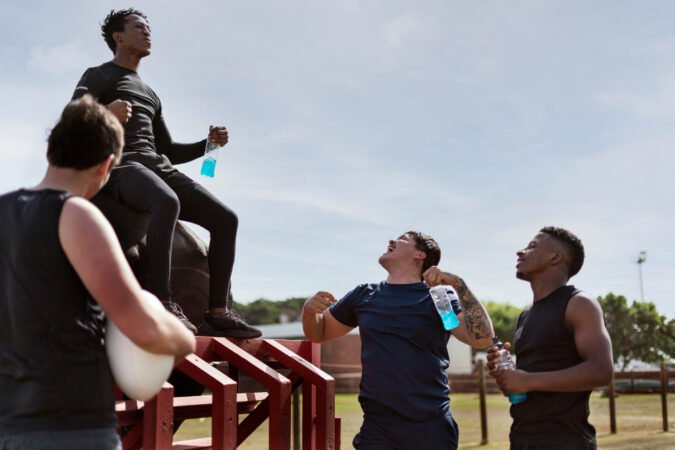The Power of Play : How Sports Shape Our World and Our Lives
Sports have been an integral part of human culture for millennia, shaping societies, influencing economies, and inspiring individuals to push the boundaries of human potential. From ancient civilizations to modern metropolises, the impact of competitive games on our world is undeniable. This blog post explores the multifaceted nature of sports, examining their historical significance, psychological benefits, economic impact, and role in fostering social change.
The Historical Tapestry of Sports
The origins of competitive games can be traced back to the dawn of human civilization. Ancient cultures engaged in various forms of physical competition, often as part of religious rituals or military training. The Olympic Games, first held in ancient Greece in 776 BCE, stand as a testament to the enduring nature of organized competitive games (Kyle, 2014). These early competitions laid the foundation for the diverse array of sports we enjoy today.
As societies evolved, so did their sports. The Middle Ages saw the rise of tournaments and jousting, while the Industrial Revolution brought about the codification of many modern competitive games. The late 19th and early 20th centuries witnessed the birth of international sporting events, such as the modern Olympic Games in 1896 and the FIFA World Cup in 1930 (Guttmann, 2004).
The Psychology of Sports : More Than Just a Game
Physical activity is not merely physical contests; they are profound psychological experiences for both participants and spectators. The concept of “flow,” introduced by psychologist Mihaly Csikszentmihalyi, is often experienced by athletes during peak performance. This state of complete absorption in an activity can lead to improved focus, creativity, and overall well-being (Csikszentmihalyi, 1990).
Participation in sports has been linked to numerous psychological benefits, including:
- Increased self-esteem and confidence
- Improved mood and reduced symptoms of depression and anxiety
- Enhanced cognitive function and academic performance
- Better stress management and coping skills
Research has shown that regular physical activity, including sports participation, can have a positive impact on mental health across all age groups (Eime et al., 2013). Moreover, team sports foster social connections and teach valuable life skills such as cooperation, leadership, and resilience.
The Economic Powerhouse of Sports
The sports industry has grown into a global economic juggernaut, with a market size estimated at $388.3 billion in 2020 and projected to reach $599.9 billion by 2025 (BusinessWire, 2021). This massive industry encompasses various sectors, including:
- Professional leagues and teams
- Sporting goods and apparel
- Media and broadcasting
- Tourism and event management
- Betting and fantasy sports
The economic impact of competitive games extends far beyond direct revenue generation. Major sporting events, such as the Olympics or the FIFA World Cup, can stimulate local economies through increased tourism, infrastructure development, and job creation. However, the long-term economic benefits of hosting such events are often debated among economists (Zimbalist, 2015).
Sports as a Catalyst for Social Change
Throughout history, sports have played a significant role in addressing social issues and promoting equality. The power of sports to unite people across cultural, racial, and socioeconomic divides is unparalleled. Some notable examples of sports as a vehicle for social change include:
- Jackie Robinson breaking the color barrier in Major League Baseball in 1947, paving the way for desegregation in American sports (Tygiel, 1997).
- The “Ping-Pong Diplomacy” of 1971, which helped thaw relations between the United States and China (Itoh, 2011).
- The boycott of South African sports during the apartheid era, which contributed to international pressure against the regime (Booth, 2003).
In recent years, athletes have increasingly used their platforms to advocate for social justice causes. The Black Lives Matter movement, for instance, has gained significant visibility through the actions of athletes across various sports (Boykoff, 2020).
The Globalization of Sports
The advent of modern communication technologies and increased global connectivity has transformed competitive games into a truly international phenomenon. The English Premier League, for example, boasts a massive global following, with fans tuning in from every corner of the world. This globalization has led to:
- The cross-pollination of sports cultures, with traditionally regional sports gaining international appeal
- The emergence of global sporting icons who transcend national boundaries
- The development of international competitive games governance bodies to manage global competitions
However, the globalization of competitive games has also raised concerns about the commercialization of athletic pursuits and the potential loss of local sporting traditions (Maguire, 1999).
The Future : Challenges and Opportunities
As we look to the future, the world of sports faces both challenges and opportunities:
- Technological advancements: The integration of technologies such as virtual and augmented reality, artificial intelligence, and wearable devices is reshaping how we experience and participate in sports (Fry, 2015).
- E-sports and gaming: The rise of competitive video gaming challenges traditional definitions of sports and athleticism (Jenny et al., 2017).
- Climate change: Environmental concerns are forcing sports organizations to reconsider their practices and adapt to changing conditions (Orr & Inoue, 2019).
- Inclusivity and diversity: There is a growing emphasis on making competitive games more accessible and representative of diverse populations (Cunningham, 2019).
- Mental health awareness: The sports world is increasingly recognizing the importance of mental health support for athletes (Reardon et al., 2019).
Conclusion : The Enduring Legacy
Sports have been a constant companion throughout human history, evolving alongside our societies and reflecting our values, aspirations, and challenges. From the ancient Olympics to modern-day global spectacles, sports continue to captivate our imaginations, unite communities, and inspire greatness.
As we navigate the complexities of the 21st century, the power of sports to bring people together, promote physical and mental well-being, drive economic growth, and effect social change remains as relevant as ever. By embracing the positive aspects of sports while addressing the challenges they face, we can ensure that the world of athletics continues to enrich our lives and shape our world for generations to come.
Whether as participants or spectators, we all have a role to play in writing the next chapter of this remarkable human endeavor. So let us celebrate the power of play and the enduring legacy of competitive games in our lives and our world.
Written by : Farokh Shabbir
References
Boykoff, J. (2020). Activism and the Olympics: Dissent at the Games in Vancouver and London. Rutgers University Press.
BusinessWire. (2021). Global Sports Market Report 2021: COVID-19 Impact and Recovery to 2030 – ResearchAndMarkets.com. Retrieved from [URL]
Csikszentmihalyi, M. (1990). Flow: The Psychology of Optimal Experience. Harper & Row.
Cunningham, G. B. (2019). Diversity and Inclusion in Sport Organizations: A Multilevel Perspective. Routledge.
Eime, R. M., Young, J. A., Harvey, J. T., Charity, M. J., & Payne, W. R. (2013). A Systematic Review of the Psychological and Social Benefits of Participation in Sport for Children and Adolescents: Informing Development of a Conceptual Model of Health through Sport. International Journal of Behavioral Nutrition and Physical Activity, 10(1), 98.
Fry, J. (2015). Sport Technology and the Law: The Future of Sport. In S. Greenfield & G. Osborn (Eds.), Routledge Handbook of Sports Law (pp. 377-390). Routledge.
Guttmann, A. (2004). From Ritual to Record: The Nature of Modern Sports. Columbia University Press.
Itoh, M. (2011). The Origin of Ping-Pong Diplomacy: The Forgotten Architect of Sino-U.S. Rapprochement. Palgrave Macmillan.
Jenny, S. E., Manning, R. D., Keiper, M. C., & Olrich, T. W. (2017). Virtual(ly) Athletes: Where eSports Fit Within the Definition of “Sport”. Quest, 69(1), 1-18.
Kyle, D. G. (2014). Sport and Spectacle in the Ancient World. John Wiley & Sons.
Maguire, J. (1999). Global Sport: Identities, Societies, Civilizations. Polity Press.
Orr, M., & Inoue, Y. (2019). Sport versus Climate: Introducing the Climate Vulnerability of Sport Organizations Framework. Sport Management Review, 22(4), 452-463.
Reardon, C. L., Hainline, B., Aron, C. M., Baron, D., Baum, A. L., Bindra, A., … & Engebretsen, L. (2019). Mental Health in Elite Athletes: International Olympic Committee Consensus Statement (2019). British Journal of Sports Medicine, 53(11), 667-699.
Tygiel, J. (1997). Baseball’s Great Experiment: Jackie Robinson and His Legacy. Oxford University Press.
Zimbalist, A. (2015). Circus Maximus: The Economic Gamble Behind Hosting the Olympics and the World Cup. Brookings Institution Press.











